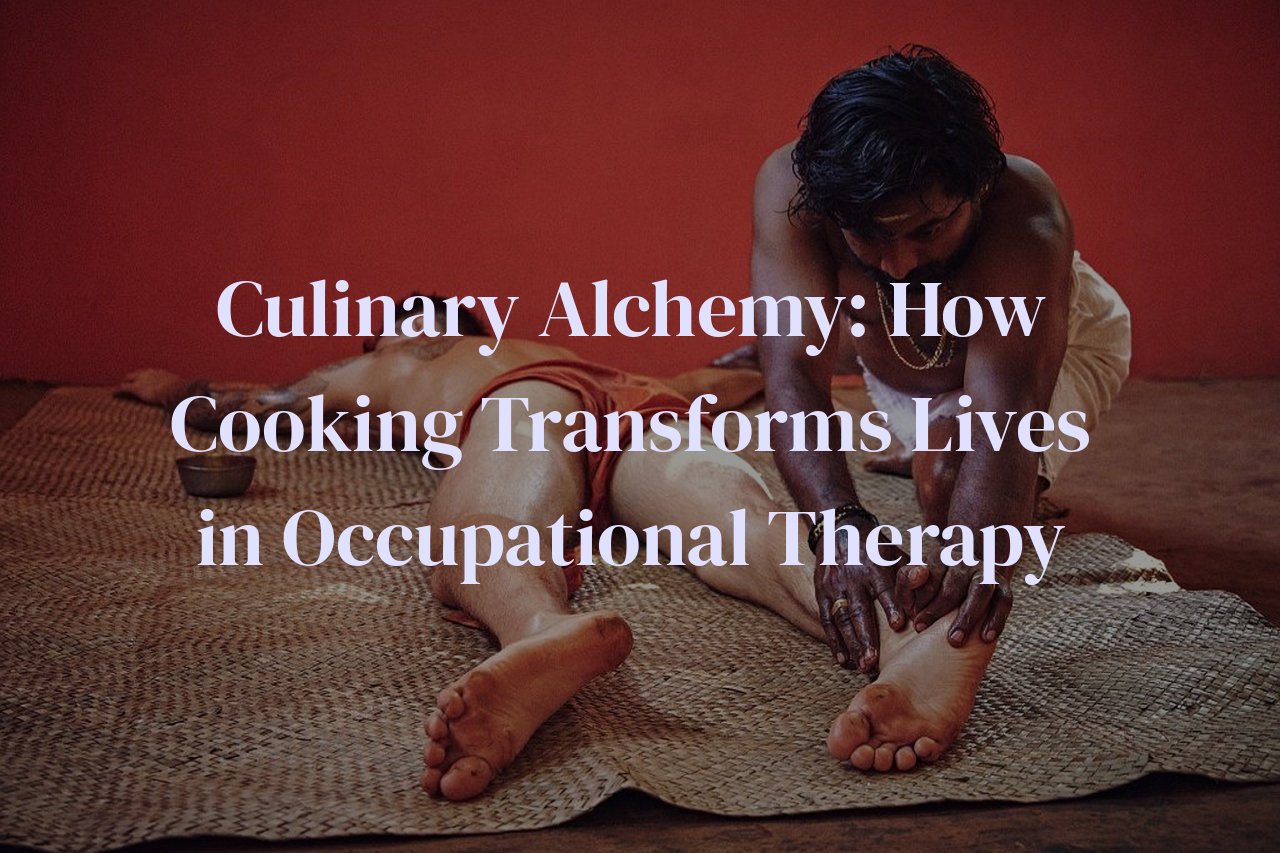
Imagine a therapy session where the aroma of freshly baked bread fills the air, and the simple act of chopping vegetables serves as both a physical and emotional healing process. This blog post delves into the unique intersection of culinary skills and occupational therapy. It explores the benefits of incorporating cooking activities into therapeutic practices, illustrating how culinary tasks can foster physical rehabilitation, cognitive improvement, emotional well-being, and enhanced social skills.
Through this post, you’ll gain insights into the transformative power of integrating culinary skills into occupational therapy, practical applications, and real-life success stories. Whether you are an occupational therapist seeking new methods or someone interested in the healing power of cooking, this post promises to enrich your understanding and offer tangible benefits that can be applied in various therapeutic settings.
Table of Contents
The Therapeutic Benefits of Culinary Skills
Cooking isn’t just about preparing nutritious meals; it’s a magical journey that intertwines art, science, and therapy, especially in the realm of occupational therapy. As an advocate for integrating culinary skills into occupational therapy, I have witnessed how the simple act of cooking can ignite profound transformations in individuals.
One of the most compelling therapeutic benefits is the enhancement of fine motor skills. Chopping vegetables, kneading dough, or stirring a pot of soup might seem mundane, but these tasks demand precision and dexterity. These repetitive motions are instrumental in reconditioning muscle memory and developing hand strength, fundamentally boosting physical rehabilitation.
The sensory stimulation associated with cooking is another therapeutic facet that cannot be overlooked. The aroma of spices, the sizzle of frying onions, and the vibrant colors of fresh produce create a multisensory experience. This sensory enrichment can ground individuals in the present moment, making it a powerful tool for enhancing mindfulness and reducing anxiety levels.
Occupational therapists often emphasize the importance of goal-setting in rehabilitation, and cooking inherently aligns with this approach. Preparing a dish involves planning, sequencing, and executing a series of tasks, all of which are integral aspects of cognitive rehabilitation. The sense of accomplishment upon completing a recipe fosters a positive mindset and boosts self-esteem, which is critical for emotional healing.
Another transformative benefit of culinary skills is the opportunity for emotional expression and creativity. Cooking allows individuals to convey their emotions through flavors and presentations. This creative outlet can be particularly therapeutic for those grappling with mental health challenges such as depression and PTSD, providing them a sense of control and purpose.
Furthermore, the social aspects of cooking are profound. Preparing meals can be a communal activity, fostering connections and strengthening relationships. It encourages collaboration, communication, and problem-solving as individuals work together to create a meal. The shared experience of dining together further reinforces these bonds, cultivating a sense of belonging and community.
Through my years of integrating culinary skills into occupational therapy, I have encountered countless stories of resilience and triumph. For instance, I recall a patient who had lost the use of his dominant hand due to a stroke. Through tailored cooking activities, he not only regained his independence but also rediscovered his passion for life. His journey serves as a testament to the profound impact culinary therapy can have on an individual’s physical, emotional, and social well-being.
In conclusion, the therapeutic benefits of culinary skills extend far beyond the kitchen. They offer a holistic approach to rehabilitation and healing, making them an invaluable component of occupational therapy. The transformative power of cooking lies in its ability to nurture the body, mind, and soul, ultimately enriching lives and fostering a deeper connection with oneself and others.
Physical Rehabilitation through Cooking
When it comes to physical rehabilitation, the kitchen can serve as an unexpectedly powerful arena of recovery and growth. From my experience, integrating culinary skills into occupational therapy not only accelerates physical rehabilitation but also adds a layer of joy and satisfaction to what can otherwise be a mundane process.
Enhancing Fine Motor Skills
Chopping vegetables, measuring ingredients, and stirring pots require precise finger movements and control. These activities are comparable to many fine motor exercises prescribed by therapists, but with the added benefit of a delicious end product. I have seen individuals suffering from arthritis or post-stroke complications rediscover the agility of their fingers through the simple yet challenging task of cooking.
Improving Gross Motor Skills
Even broader movements, like kneading dough or lifting cooking pots, contribute to the improvement of gross motor skills. Lifting heavy pots or standing over a stove requires significant core strength and balance, which can be crucial in physical rehabilitation. A patient with back issues, for instance, can benefit from the controlled and repetitive motions involved in cooking, helping them build core stability and reduce pain.
Hand-Eye Coordination
A kitchen is a treasure trove for enhancing hand-eye coordination. From pouring liquids to precisely cutting ingredients, every action taken in the kitchen aids in synchronizing bodily movements with visual cues. This is particularly beneficial for those recovering from injuries or surgeries that have impaired their coordination.
Range of Motion
Cooking is a physically dynamic activity. Whether it is reaching for spices on a high shelf, bending down to take out a baking tray, or stretching to place a dish on the table, each motion extends the range of mobility in a controlled and safe environment. I have personally seen patients gradually extend their range of motion significantly through regular culinary exercises.
Breaking Monotony of Traditional Exercises
Physical rehabilitation often involves repetitive, monotonous activities that can quickly become tiresome. In contrast, cooking is inherently varied and engaging. The sensory allure of food—the smells, textures, and flavors—provides an immersive experience that distracts from the physical effort and amplifies the therapeutic benefits of each action.
Building Confidence
Lastly, the sense of accomplishment that comes from creating a meal cannot be overstated. Completing a recipe successfully not only validates the progress in physical capabilities but also boosts overall self-esteem. This psychological uplift plays a crucial role in the speed and quality of physical recovery.
In conclusion, incorporating culinary skills into physical rehabilitation offers a multi-faceted approach that not only improves physical abilities but also enriches the therapeutic experience. It transforms the kitchen into a place of healing where every meal is a step towards a healthier, more functional life.
Cognitive Improvements in the Kitchen
The kitchen, often called the heart of the home, is not just a place for preparing food. It is a dynamic environment that can foster cognitive improvements and mental acuity. The act of cooking requires an intricate symphony of mind and senses, making it an ideal therapeutic approach in occupational therapy.
First and foremost, cooking demands planning and organizational skills. When you are working with patients, guiding them to set out the ingredients, read through the recipe, and understand the sequence of steps can significantly enhance their executive functions. It’s about more than just following a recipe; it’s about making a mental map and executing it step-by-step. This layered activity helps in improving attention to detail, multitasking, and strategic planning.
Memory is another cognitive area that can benefit immensely from culinary activities. Remembering recipes, techniques, and even the placement of various kitchen tools can act as a cognitive exercise. This kind of repetitive task can boost both short-term and long-term memory retention. I recall working with a patient who had suffered a stroke; over time, remembering recipes and steps to prepare meals significantly improved her recall ability.
Problem-solving skills are frequently put to the test while cooking. Ingredients may run out, something may burn, or a dish may not turn out as expected. In these scenarios, the kitchen becomes a lab for cognitive resilience. Patients learn to adapt, make quick decisions, and find creative solutions, amplifying their problem-solving abilities in a real-world setting. For example, one of my clients took great pride in creating a completely new sauce when the original ingredients went missing, displaying not just culinary creativity but robust cognitive flexibility.
Additionally, the development of sensory perception through taste, smell, and touch during cooking should not be overlooked. Tasting food for seasoning adjustments or recognizing when something is done by smell are complex sensory tasks that engage different parts of the brain. These activities help in honing sensory discrimination and processing, contributing to overall cognitive refinement.
Cooking also encourages educational improvements by familiarizing individuals with mathematical concepts such as measurements, ratios, and proportions. Simple acts like measuring ingredients or converting units provide a practical application of math skills. I vividly remember a young patient who struggled with math at school but found a new appreciation and understanding of numbers through baking, bridging academic challenges with real-life applications.
Finally, engaging in culinary activities can stimulate linguistic and verbal skills. Reading recipes, following instructions, or even participating in a cooking class involves a lot of communication. This can help improve language comprehension, vocabulary, and even speech in patients recovering from conditions like aphasia. One of the most heartwarming experiences was watching a patient eloquently narrate her recipe during a group session, marking significant progress in her speech therapy journey.
Emotional and Psychological Healing through Culinary Skills
When I think back to the afternoons spent cooking with my grandmother, I realize now how those moments were more than just about food. They were about emotional and psychological healing. The therapeutic potential of culinary activities is immense and profoundly transformative.
Firstly, engaging in cooking can significantly reduce stress and anxiety. The rhythmic motions of chopping, stirring, and kneading create a soothing, meditative state. I’ve found that losing myself in a complex recipe helps me forget about my worries. The process puts my mind at ease, almost like a form of active meditation.
Cooking also provides a sense of accomplishment and boosts self-esteem. The simple act of creating something delicious from raw ingredients can be highly gratifying. I recall the first time I made a lasagna from scratch—it was more than just a meal; it was a testament to my capabilities. This feeling of mastery and achievement can be particularly empowering for individuals in occupational therapy, helping them regain a sense of control over their lives.
Moreover, culinary activities offer an excellent channel for emotional expression. The act of cooking allows you to infuse your dish with your feelings. When I’m joyous, my kitchen fills with bright, zesty flavors; when I’m saddened, the food becomes more comforting and hearty. This ability to communicate emotions through food can be incredibly therapeutic and form a non-verbal outlet for people who may struggle to express themselves otherwise.
Another important aspect of emotional healing through cooking is its potential to connect individuals with their cultural heritage. Preparing traditional dishes can evoke fond memories and provide a sense of identity and belonging. I remember how the aroma of my mother’s special curry would fill our home during festivals, making me feel a strong connection to my roots. For people undergoing therapy, these culinary traditions can serve as a comforting reminder of their lineage and history.
Lastly, there’s an undeniable joy in the act of nourishing yourself and others. Cooking fosters a nurturing environment, leading to improved emotional well-being. Every time I cook a meal for my family or friends, the act of serving them becomes a gesture of love and care, reinforcing our emotional bonds and giving me immense satisfaction.
Incorporating culinary skills into occupational therapy can be life-changing. It’s not just about learning to cook; it’s about discovering a profound method for emotional and psychological healing. Whether it’s through stress reduction, an increased sense of accomplishment, emotional expression, cultural connection, or the sheer joy of nurturing, cooking has the power to transform lives in the most heartwarming way.
Social Bonding and Community Building: The Culinary Experience
The kitchen has always been considered the heart of the home, and in occupational therapy, it transforms into the heart of community and social bonding. From my personal journey as a healthcare professional, I’ve witnessed how cooking can create an inclusive environment for individuals to connect and heal together.
One of the most remarkable aspects of integrating culinary skills into occupational therapy is the way it fosters social connections. Participants often share their own recipes and cooking techniques, sparking conversations that transcend the boundaries of typical therapy sessions. This exchange of culinary knowledge not only enriches the experience but also builds a sense of respect and appreciation for diverse cultural backgrounds.
I remember a particular session where a group of veterans with varying physical and emotional challenges came together to cook a meal. The kitchen, filled with the comforting aroma of herbs and spices, became a sanctuary where walls of isolation crumbled. They laughed as they shared stories about their favorite meals from different corners of the world. This experience emphasized that cooking together provides a safe platform for expressing and sharing personal narratives, helping individuals feel less alone in their struggles.
Furthermore, communal cooking activities nurture teamwork and collaboration, crucial elements in rebuilding trust and social skills. For instance, preparing a complex dish requires participants to communicate effectively, delegate tasks, and work in harmony, mirroring real-life social interactions. These moments become powerful illustrations of how culinary activities can translate to improved social functioning and cooperation outside the therapy environment.
The emotional support derived from these culinary gatherings is profound. Participants often find solace in the camaraderie, which acts as a buffer against feelings of loneliness and depression. The shared triumphs of creating a delicious meal together can also be incredibly uplifting, fostering a collective sense of achievement and pride.
Moreover, these cooking sessions have the potential to extend their benefits beyond individual healing. Inviting family members, friends, and even the broader community to join in fosters a wider network of support and understanding. During some sessions, we observed how involving loved ones made the therapy process more holistic and sustained positive outcomes longer as it created a continuity of care and encouragement at home.
In essence, the culinary experience in occupational therapy is not just about developing practical kitchen skills; it is about forging meaningful connections and building supportive communities. To see the transformative impact firsthand has been both humbling and inspiring, solidifying my belief in the incredible healing power of culinary alchemy.
Conclusion
Culinary skills offer a rich and multi-faceted approach to occupational therapy, providing numerous benefits that transcend traditional therapeutic boundaries. From physical rehabilitation and cognitive enhancement to emotional well-being and social bonding, integrating cooking into therapy sessions can transform lives in profound ways. So, why not bring a little culinary magic into your therapeutic practice? It might just be the recipe for success that both you and your clients have been looking for.



